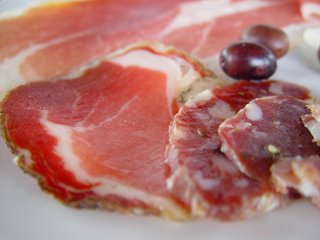Q: When does science fail as an “advance”? A: When it messes with my meat!

There is something to be gained in examining the tension between so-called “slow-food” or artisanal production of food and modern standards and regulation of hygiene. Is the regulation of old world farmers and producers an attempt to sanitize and modernize (the implicit assumption being “to improve”) the ways of our forbears?
In recent months, I have seen reports of Chinese-American food inspectors forced to “grade” Chinese BBQ shops lower because they don’t conform to modern notions of “food safety.” We recently read of old world sausage makers, struggling, or not, with the same current regulations. As John Esposito put it so perfectly, “Making sausage is hard work, and on top of that to have to answer questions and fill out forms, it’s too much. All I know is that people love my sausage, we never had a problem and it sent my kids to college.” Kissed by Air notes another producer was shut down and fought back. Think about the effort and knowledge it takes to produce Culatello or Prosciutto with Pedigree. No wonder old world producers are a dying breed.
Living as I do on the edge of Chinatown, I know that the best roast pork and roast duck is likely to be had at certain hours, in particular shops. Though I don’t speak Cantonese, I have learned a respectable ordering phrase or two. Watching and listening, I’ve picked up a tip here and there from the older women ahead of me. And I’ve learned not to fear my meat.
There is in the food world a growing appreciation of, even a celebration of, old world methods. We call it “artisanal” or “heritage”. Our grandparents called it “the way it’s done” or something equally direct. Generations have grown up nourished in body and soul, by the foods produced in the ways of our grandparents, their parents and their grandparents before them, by their hands. Production methods of the old salumiere (salami makers) rely more on touch and smell than on gauges and thermometers. Today’s artisanal producers have close relationships with their sources, using organically raised Berkshire pigs, for example. This eliminates the problems caused by huge commercial production methods, poor or unsanitary feeds and so on. It also produces wonderfully marbled meat. For more info on Berkshire pigs see Kurobuta is Some Pig.
Whether you’re talking about Japanese fishermen salting their catch or dairy farmers learning to preserve milk by turning it into cheese, many of today’s luxury products were originally borne of humble origins. People who farmed or fished for sustenance, cured and pickled and dried whatever products they could harvest, from whatever source they could claim. Most of us raised in recent generations gained a genuine appreciation for the alchemy that necessity produces. Take whatever you’ve got and make it taste good. Every last bit.
Contrast this to our current slavish devotion to science and our nearly neurotic adherence to regulation. This will keep us safe, I suppose is the belief. Well, I for one have eaten enough shoe-leather pork chops and dried out chicken. Our people did not fill their larders with USDA inspected products. They survived. Do you know anyone who’s come down with the dreaded trichinosis? And still, we inspect and regulate. And mindlessly over-cook.
I’d rather the inspectors spend time on hygiene issues like hand-washing. How many meals have rushed too quickly through me, not through the fault artisanal producers but due to the lack of hand washing on the part of the guy rinsing my lettuce? We’re focusing on the wrong things here. And why, to what end? Are we so blindly enamored of the assumed benefits of science that we willingly sacrifice the traditions of our homelands? Am I the only one who remembers choking down Tang because marketeers convinced our mothers that if the astronauts drank it, it must be good! Really? Better than fresh OJ? I don’t think so.
Give me a good salumiere’s sausage any day, and I’ll take mine with a side order of “Let me tell you how my father taught me to make this….”




2 Comments:
Thank you for visiting and commenting on my blog Blogger for Dummies. Looking forward to your visits again. Just to let you know Blogger for Dummies may not be updated but all new posts for the time being will go to Blogger Tips and Tricks while I ponder what to do. This is because of trademark issues.
BTW, nice blog you have here. Wish I can cook.
This is a great post. I totally agree and often question the Western infatuation with modern science. Your theme reminds me of an excellent food/travelogue written by Vertamae Smart Grosvenor, called "Vibration Cooking." Look it up, it's out of print but very much worth the read.
Post a Comment
<< Home